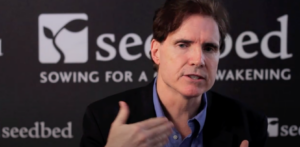The poster child for faith in the Bible is Abraham. Others had it, too, but Abraham’s faith isn’t momentary faith; this is monumental faith. This is world-changing faith. Abraham’s faith is centered not on people or preferences but on the person of God.
In other words, it is Person-centered, not people-centered. Abraham’s story has a lot to teach us about a kind of faith that is God-centered.
Faith is a kind of self-giving love. Ahahah is a Hebrew word for a kind of self-giving love. Literally, it means “I give.” The first time this word for love is used in the Old Testament is in this story of Abraham and Isaac, when the writer describes Abraham’s love for his son. Self-giving love is powerful when combined with God-honoring trust.
Faith binds us. Another Hebrew word in the story of Abraham and Isaac is akedah. The word means “binding” and it’s the word they use when they talk about binding Isaac to the altar. It teaches us that sometimes faith happens when we lay something on the altar and trust God with the questions.
Faith is not passive. It is not waiting for things to change without us having to do anything. To the contrary, God defines faith as movement. James taught that faith without works is dead.
Faith is a grace. God gives faith. It isn’t something we generate in order to get God’s attention. It is something God offers as a gift. Knowing that, faith ought to be something we pray for regularly. “Lord, give me more faith.”
Faith is a mature choice. It begins with my own decision to act like an adult so I can walk the unredeemed parts of myself out of the valleys toward Jesus.
Faith exposes the great moves of God and links us to the promises of God. Abrahamic faith watches for the great moves of God and goes after them. If I want to see God’s promises before they happen, I’m going to need a faith that will hold me between the high points.
Faith invites us to “act as if.” This is a mark of faith that circumcision signaled in the story of Abraham. It was a sign that God’s people were welcome to go ahead and act as if they were a mighty nation even before the first child was born. “Act as if” faith is a display of confidence that even when we don’t see how the lines will be drawn, God is at work.
Faith is a different kind of knowing. Some things only make sense if the path from A to B comes off the page and makes contact with the character of God. Which is to say that faith incorporates another dimension, making it a higher form of knowing.
Faith is the opposite of fear. Perfect love casts out fear, and faith connects us to that perfect love.
Faith teaches me who I am. But faith is not “I” centered. In fact, it helps us to get past the “I’s.” When we trust God, we are no longer tempted to defend ourselves. We let God have his job back.
Faith is the life of Jesus living itself out in me. Faith is about accepting the power of Jesus into our lives and walking that journey together with Jesus.
Faith has a “ram in the bush” mentality. It is the mentality that places all our hopes in the most creative being in the universe, who can take any circumstance we’re in and make good out of it.
Faith responds, “Here I am.” Three times in the story of Abraham and Isaac, we find the response: “Here I am.” It is the same response Moses gives when God calls to him from the burning bush. And it is the same response Isaiah gives when he comes into the unhindered presence of God. This is the response of greatness and it always leads us toward our created design, never away from it.
Faithfulness breeds blessings. Not necessarily blessing the way we’d define it, but blessing the way the Creator of the universe defines it, who wants to expose the greatness in us, who wants to see our influence ripple through generations, not just moments, who wants to raise dead things and redeem relationships and restore purpose and health.
Mature faith breeds blessings that change the world. Abraham is proof.








